- Home
- Octavia E. Butler
Bloodchild and Other Stories Page 9
Bloodchild and Other Stories Read online
Page 9
He took the street map down again, tapped it, pointed vaguely northeast toward Pasadena, then looked at her.
She shrugged, tapped his shoulder, then her own, and held up her index and second fingers tight together, just to be sure.
He grasped the two fingers and nodded. He was with her.
She took the map from him and threw it onto the dashboard. She pointed back southwest—back toward home. Now she did not have to go to Pasadena. Now she could go on having a brother there and two nephews—three right-handed males. Now she did not have to find out for certain whether she was as alone as she feared. Now she was not alone.
Obsidian took Hill Street south, then Washington west, and she leaned back, wondering what it would be like to have someone again. With what she had scavenged, what she had preserved, and what she grew, there was easily enough food for them. There was certainly room enough in a four-bedroom house. He could move his possessions in. Best of all, the animal across the street would pull back and possibly not force her to kill him.
Obsidian had drawn her closer to him, and she had put her head on his shoulder when suddenly he braked hard, almost throwing her off the seat. Out of the corner of her eye, she saw that someone had run across the street in front of the car. One car on the street and someone had to run in front of it.
Straightening up, Rye saw that the runner was a woman, fleeing from an old frame house to a boarded-up storefront. She ran silently, but the man who followed her a moment later shouted what sounded like garbled words as he ran. He had something in his hand. Not a gun. A knife, perhaps.
The woman tried a door, found it locked, looked around desperately, finally snatched up a fragment of glass broken from the storefront window. With this she turned to face her pursuer. Rye thought she would be more likely to cut her own hand than to hurt anyone else with the glass.
Obsidian jumped from the car, shouting. It was the first time Rye had heard his voice—deep and hoarse from disuse. He made the same sound over and over the way some speechless people did, “Da, da, da!”
Rye got out of the car as Obsidian ran toward the couple. He had drawn his gun. Fearful, she drew her own and released the safety. She looked around to see who else might be attracted to the scene. She saw the man glance at Obsidian, then suddenly lunge at the woman. The woman jabbed his face with her glass, but he caught her arm and managed to stab her twice before Obsidian shot him.
The man doubled, then toppled, clutching his abdomen. Obsidian shouted, then gestured Rye over to help the woman.
Rye moved to the woman’s side, remembering that she had little more than bandages and antiseptic in her pack. But the woman was beyond help. She had been stabbed with a long, slender boning knife.
She touched Obsidian to let him know the woman was dead. He had bent to check the wounded man who lay still and also seemed dead. But as Obsidian looked around to see what Rye wanted, the man opened his eyes. Face contorted, he seized Obsidian’s just-holstered revolver and fired. The bullet caught Obsidian in the temple and he collapsed.
It happened just that simply, just that fast. An instant later, Rye shot the wounded man as he was turning the gun on her.
And Rye was alone—with three corpses.
She knelt beside Obsidian, dry-eyed, frowning, trying to understand why everything had suddenly changed. Obsidian was gone. He had died and left her—like everyone else.
Two very small children came out of the house from which the man and woman had run—a boy and girl perhaps three years old. Holding hands, they crossed the street toward Rye. They stared at her, then edged past her and went to the dead woman. The girl shook the woman’s arm as though trying to wake her.
This was too much. Rye got up, feeling sick to her stomach with grief and anger. If the children began to cry, she thought she would vomit.
They were on their own, those two kids. They were old enough to scavenge. She did not need any more grief. She did not need a stranger’s children who would grow up to be hairless chimps.
She went back to the car. She could drive home, at least. She remembered how to drive.
The thought that Obsidian should be buried occurred to her before she reached the car, and she did vomit.
She had found and lost the man so quickly. It was as though she had been snatched from comfort and security and given a sudden, inexplicable beating. Her head would not clear. She could not think.
Somehow, she made herself go back to him, look at him. She found herself on her knees beside him with no memory of having knelt. She stroked his face, his beard. One of the children made a noise and she looked at them, at the woman who was probably their mother. The children looked back at her, obviously frightened. Perhaps it was their fear that reached her finally.
She had been about to drive away and leave them. She had almost done it, almost left two toddlers to die. Surely there had been enough dying. She would have to take the children home with her. She would not be able to live with any other decision. She looked around for a place to bury three bodies. Or two. She wondered if the murderer were the children’s father. Before the silence, the police had always said some of the most dangerous calls they went out on were domestic disturbance calls. Obsidian should have known that—not that the knowledge would have kept him in the car. It would not have held her back either. She could not have watched the woman murdered and done nothing.
She dragged Obsidian toward the car. She had nothing to dig with her, and no one to guard for her while she dug. Better to take the bodies with her and bury them next to her husband and her children. Obsidian would come home with her after all.
When she had gotten him onto the floor in the back, she returned for the woman. The little girl, thin, dirty, solemn, stood up and unknowingly gave Rye a gift. As Rye began to drag the woman by her arms, the little girl screamed, “No!”
Rye dropped the woman and stared at the girl.
“No!” the girl repeated. She came to stand beside the woman. “Go away!” she told Rye.
“Don’t talk,” the little boy said to her. There was no blurring or confusing of sounds. Both children had spoken and Rye had understood. The boy looked at the dead murderer and moved further from him. He took the girl’s hand. “Be quiet,” he whispered.
Fluent speech! Had the woman died because she could talk and had taught her children to talk? Had she been killed by a husband’s festering anger or by a stranger’s jealous rage? And the children … they must have been born after the silence. Had the disease run its course, then? Or were these children simply immune? Certainly they had had time to fall sick and silent. Rye’s mind leaped ahead. What if children of three or fewer years were safe and able to learn language? What if all they needed were teachers? Teachers and protectors.
Rye glanced at the dead murderer. To her shame, she thought she could understand some of the passions that must have driven him, whomever he was. Anger, frustration, hopelessness, insane jealousy … how many more of him were there—people willing to destroy what they could not have?
Obsidian had been the protector, had chosen that role for who knew what reason. Perhaps putting on an obsolete uniform and patrolling the empty streets had been what he did instead of putting a gun into his mouth. And now that there was something worth protecting, he was gone.
She had been a teacher. A good one. She had been a protector, too, though only of herself. She had kept herself alive when she had no reason to live. If the illness let these children alone, she could keep them alive.
Somehow she lifted the dead woman into her arms and placed her on the backseat of the car. The children began to cry, but she knelt on the broken pavement and whispered to them, fearful of frightening them with the harshness of her long unused voice.
“It’s all right,” she told them. “You’re going with us, too. Come on.” She lifted them both, one in each arm. They were so light. Had they been getting enough to eat?
The boy covered her mouth with his hand, but she moved her face a
way. “It’s all right for me to talk,” she told him. “As long as no one’s around, it’s all right.” She put the boy down on the front seat of the car and he moved over without being told to, to make room for the girl. When they were both in the car, Rye leaned against the window, looking at them, seeing that they were less afraid now, that they watched her with at least as much curiosity as fear.
“I’m Valerie Rye,” she said, savoring the words. “It’s all right for you to talk to me.”
Afterword
“Speech Sounds” was conceived in weariness, depression, and sorrow. I began the story feeling little hope or liking for the human species, but by the time I reached the end of it, my hope had come back. It always seems to do that. Here’s the story behind “Speech Sounds.”
In the early 1980s, a good friend of mine discovered that she was dying of multiple myeloma, an especially dangerous, painful form of cancer. I had lost elderly relatives and family friends to death before this, but I had never lost a personal friend. I had never watched a relatively young person die slowly and painfully of disease. It took my friend a year to die, and I got into the habit of visiting her every Saturday and taking along the latest chapter of the novel I was working on. This happened to be Clay’s Ark. With its story of disease and death, it was thoroughly inappropriate for the situation. But my friend had always read my novels. She insisted that she wanted to read this one as well. I suspect that neither of us believed she would live to read it in its completed form—although, of course, we didn’t talk about this.
I hated going to see her. She was a good person, I loved her, and I hated watching her die. Nevertheless, every Saturday I got on a bus—I don’t drive—and went to her hospital room or her apartment. She got thinner and frailer and querulous with pain. I got more depressed.
One Saturday, as I sat on a crowded, smelly bus, trying to keep people from stepping on my ingrown toenail and trying not to think of terrible things, I noticed trouble brewing just across from me. One man had decided he didn’t like the way another man was looking at him. Didn’t like it at all! It’s hard to know where to look when you’re wedged in place on a crowded bus.
The wedged-in man argued that he hadn’t done anything wrong—which he hadn’t. He inched toward the exit as though he meant to get himself out of a potentially bad situation. Then he turned and edged back into the argument. Maybe his own pride was involved. Why the hell should he be the one to run away?
This time the other guy decided that it was his girlfriend—sitting next to him—who was being looked at inappropriately. He attacked.
The fight was short and bloody. The rest of us—the other passengers—ducked and yelled and tried to avoid being hit. In the end, the attacker and his girlfriend pushed their way off the bus, fearful that the driver would call the police. And the guy with the pride sagged, dazed and bloody, looking around as though he wasn’t sure what had happened.
I sat where I was, more depressed than ever, hating the whole hopeless, stupid business and wondering whether the human species would ever grow up enough to learn to communicate without using fists of one kind or another.
And the first line of a possible story came to me: “There was trouble aboard the Washington Boulevard bus.”
Crossover
At work that day, they put her to soldering J9 connectors into a harness, and they expected her to do twice as many as everyone else. She did, of course, but her only reward was resentment from the slower girls down the line because she was making them look bad. At lunch a couple of them came to her solitary corner table and told her to ease off. That was how it was. If she did good work, other employees resented her and her lead man ignored her. If her work fell off, other employees ignored her and her lead man wrote “bad attitude” on her work review. She hadn’t had a raise in two years. She would have quit long ago had she not been afraid to try to start all over again at a new place where the people might be even worse.
Through the afternoon all she wanted was two or three aspirins and sleep. She had not had a headache for three months and this one scared her.
As usual, though, she managed to finish the day. When she got off she even felt hungry enough to make a side trip to the store for a can of something for dinner. It was her headache that drove her to make the shorter trip to the liquor store instead of going to the grocery store. It was her headache.
The liquor store was on a corner only two blocks from where she worked. It was across from a pool hall and a bar and near a cheap hotel. That made it a gathering place for certain kinds of people.
There was a crowd on the corner when she got there. Besides the usual drunks and prostitutes, there was a group of teenage boys who were bored enough not to ignore her. For a moment they whispered to each other, laughing. Then as she passed them, the calls began.
“Hey, Jeffery, there go your old woman!”
“Lady, you sure shouldn’t have let that car run over you face!”
“Hey, lady, this boy say he go for you!”
A wino sidled up to her. “Come on, baby, let’s you and me go up to my room.”
She jerked herself out of the alcoholic cloud that surrounded him and went into the store. The clerk there was rude to her because he was rude to everyone. He did not matter any more than the others. The wino tried to catch her by the arm as she left.
“Come on, you not in too big a hurry to talk to me.…” She almost ran from him, barely controlling her disgust. She left him standing, swaying slightly in the middle of the street, staring after her.
As she neared the hotel she noticed someone standing in the narrow doorway. A man who had something wrong with his face. Something … She almost turned and went back toward the drunk. But the man stepped out and came over to her during her moment of hesitation. She looked around quickly, her eyes wide with fear. No one was paying any particular attention to her. Even the wino had begun to move away.
The man said, “I don’t go away if you ignore me.” He had a scar that ran the length of his face from eye to chin on the left side. When he talked or smiled or frowned, it moved and she could watch it and ignore everything else. Sometimes she could even avoid listening to him. Now she watched it and thought quickly.
“So you got out.” There was nothing but bitterness in her voice.
He laughed and the scar curved, wormlike. “This morning. I expected you to be there to meet me.”
“No you didn’t. I told you three months ago you could stay locked up forever as far as I was concerned.”
“And you didn’t mean it then either. Ninety days. That’s a long time.”
“You should have thought about that before you got into the fight.”
“Yeah. Man hits me and pulls a knife. I had all the time in the world to remember you didn’t want me fighting.” He paused. “You know, you could have come to see me just once while I was in.”
“I’m sorry.” Toneless. False without any attempt to hide the falseness.
He made a sound of disgust. “The day you’re sorry for anything …”
“All right, I’m not sorry. I don’t give a damn.” She narrowed her eyes and threw the words at him. “Why don’t you go find a girl who will come to see you next time you get put away?”
The scar hardly moved when he spoke. “Things changed that much in three months?”
“They changed that much.”
“You find somebody else to kind of help you forget about me?”
Now she laughed, once, with absolute bitterness. “Not one, baby, dozens! Didn’t you see them all back there on the corner? They couldn’t wait to get to me!”
Quietly: “All right. All right, be quiet.” He put an arm around her and walked with her toward her apartment.
Later, when they had eaten and made love, she sat head in hands trying not to think while he talked at her. She paid no attention until he asked a question that she wanted to answer.
“Don’t you ever wish for a decent-looking guy to come and get
you out of that factory and out of this dump you live in … and away from me?”
“What would a decent-looking guy want with me?”
Instead of answering he said, “You still have that bottle of sleeping pills in your medicine cabinet?”
When she did not answer, he went to look. “Nonprescription now,” he said when he came back. “What happened to the others?”
“I poured them down the toilet.”
“Why?”
Again she did not answer.
After a moment, he said more gently, “When?”
“When I … when they put you in jail.”
“And you acted like you didn’t expect to see me again.”
She shook her head. “I didn’t.”
“I don’t want to die any more than you do.”
She jumped and glanced at him. He knew better than to talk like that. He did it to hurt her. That was all.
She said, “I’d rather be dead than here picking up where we left off three months ago.”
“Then why’d you throw out the pills?”
“So I would live. Without you.”
He smiled. “And when did you decide you couldn’t?”
She threw the heavy glass ashtray beside the bed. It flew wide of him, dented the wall behind him, and broke into three pieces.
He looked from the pieces to her. “You would have made your point better if you had tried to hit me.”
She began to cry and she was not aware when the crying became screaming. “Get out of here! Leave me alone! Leave me alone!”
He didn’t move.
Then her neighbor was pounding on the door to find out what all the noise was about. She calmed herself enough to open it, but while she was reassuring the woman that everything was all right, he came up behind her and stood there. She did not have to look around to know he was there. Still, she did not come near losing control until her neighbor said, “You must be lonesome over here by yourself. Why don’t you come around to my apartment and talk for a while?”

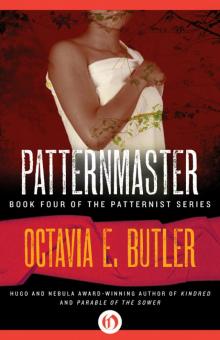 Patternmaster
Patternmaster Survivor
Survivor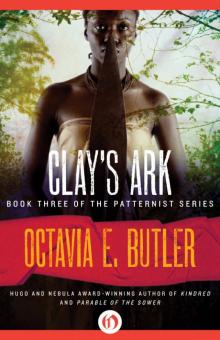 Clay's Ark
Clay's Ark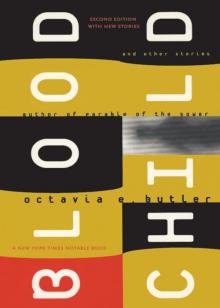 Bloodchild and Other Stories
Bloodchild and Other Stories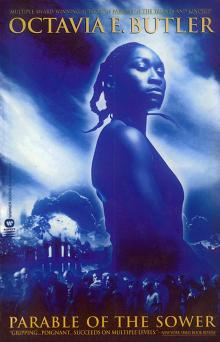 Parable of the Sower
Parable of the Sower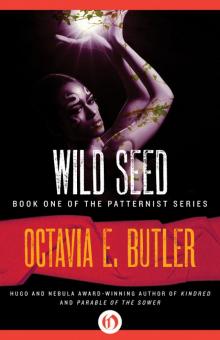 Wild Seed
Wild Seed Fledgling
Fledgling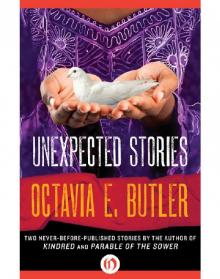 Unexpected Stories
Unexpected Stories Kindred
Kindred Lilith's Brood: Dawn / Adulthood Rites / Imago
Lilith's Brood: Dawn / Adulthood Rites / Imago Adulthood Rites
Adulthood Rites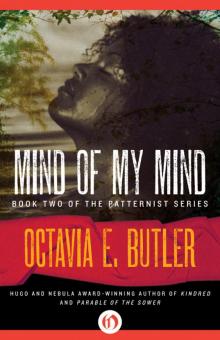 Mind of My Mind
Mind of My Mind Seed to Harvest
Seed to Harvest Lilith's Brood: Dawn, Adulthood Rites, and Imago (Xenogenesis Trilogy)
Lilith's Brood: Dawn, Adulthood Rites, and Imago (Xenogenesis Trilogy) Bloodchild
Bloodchild Seed to Harvest: Wild Seed, Mind of My Mind, Clay's Ark, and Patternmaster (Patternist)
Seed to Harvest: Wild Seed, Mind of My Mind, Clay's Ark, and Patternmaster (Patternist)